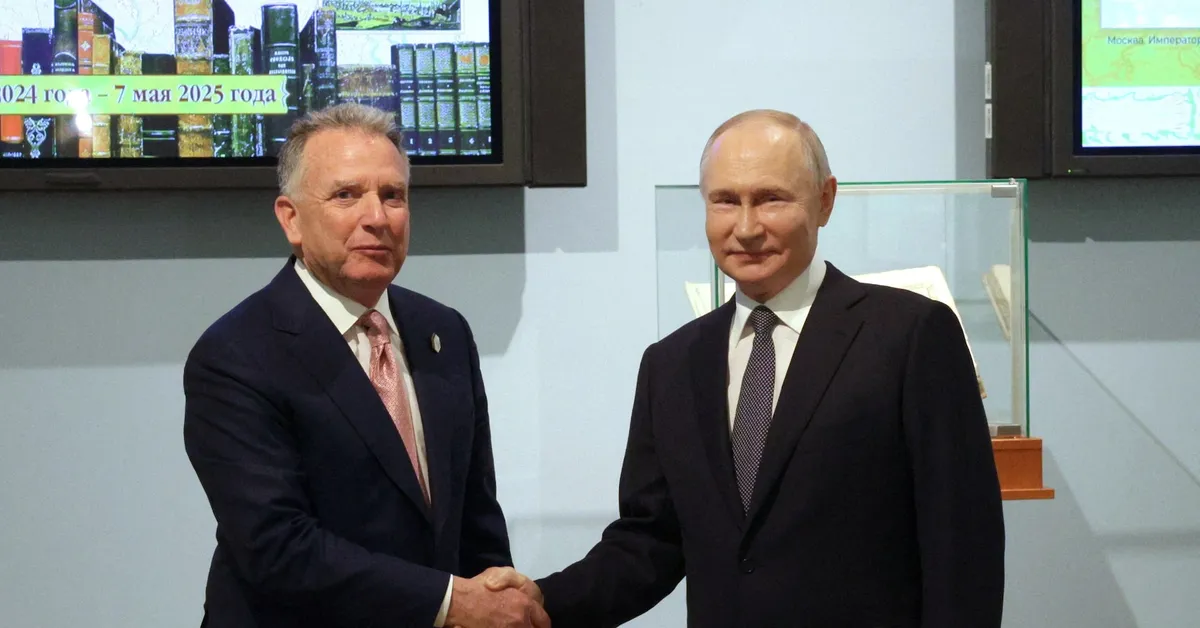
In a significant development in U.S.-Russia relations, less than 48 hours after a dinner meeting with a negotiator appointed by Russian President Vladimir Putin, Steve Witkoff, the U.S. special envoy for Ukraine, met with President Donald Trump at the White House. During this meeting, Witkoff proposed that the quickest path to achieving a ceasefire in Ukraine would involve endorsing a strategy that grants Russia control over four eastern Ukrainian regions that it attempted to annex illegally in 2022. This assertion was corroborated by two U.S. officials and five individuals familiar with the situation, as reported by Reuters.
Witkoff's proposition, which he had previously articulated during a podcast with conservative media figure Tucker Carlson, has been met with outright rejection from Kyiv. Additionally, it has raised eyebrows among some U.S. and European officials who view it as an extreme demand from Russia. General Keith Kellogg, Trump's envoy on Ukraine, challenged Witkoff's stance during the White House meeting, emphasizing that while Ukraine might consider negotiating specific terms regarding disputed territories, it would never consent to relinquishing total ownership of these regions to Russia, according to two sources present at the discussion.
The meeting concluded without any resolution or a shift in the U.S. strategy towards Ukraine. Subsequently, Witkoff traveled to Russia to engage directly with Putin, reflecting the growing divide among Trump administration officials regarding the best approach to resolving the Ukraine crisis.
As the Trump administration grapples with internal disagreements, the contrasting views of Witkoff and Kellogg highlight the tension in the U.S. approach to the ongoing conflict. Witkoff, who has garnered support from certain factions within the Republican Party that are skeptical of U.S. involvement in Ukraine, has nevertheless faced backlash from others who believe that the administration's current trajectory leans too favorably toward Moscow. Following Witkoff's interview with Carlson, several Republican lawmakers expressed their concerns to National Security Adviser Mike Waltz and Secretary of State Marco Rubio, indicating a palpable unease regarding Witkoff's perceived pro-Russian sentiments.
Since taking office, President Trump has significantly altered U.S. foreign policy, advocating for a ceasefire in Ukraine while relaxing many of the punitive measures previously imposed on Russia for its full-scale invasion of Ukraine. This shift has raised alarms among U.S. and European officials, who worry that Witkoff's inexperience in high-stakes negotiations may be exploited by the Russians as they seek to maintain their influence in the region.
Amid growing concerns regarding Witkoff's leadership, Republican donor Eric Levine expressed in a letter that Witkoff should be replaced by Rubio, reflecting dissatisfaction within party lines. Trump has frequently stated his desire to secure a ceasefire in Ukraine by May, emphasizing the urgent need to end a conflict that has resulted in immense human suffering and poses a risk of escalation between the U.S. and Russia. However, despite attempts at creating partial ceasefire agreements—one focusing on energy infrastructure and another concerning operations in the Black Sea—progress has stalled, leading to frustration in the White House.
Witkoff’s influence in the Trump administration is increasing, as he has been pivotal in previous diplomatic successes, such as negotiating a ceasefire in Gaza and securing the release of U.S. citizen Marc Fogel from Russia. He continues to push for a strategy that involves ceding the contested eastern Ukrainian regions—Luhansk, Donetsk, Zaporizhzhia, and Kherson—to Russia, asserting that they are primarily Russian-speaking regions with a supposed public desire to be governed by Russia. These comments have drawn sharp criticism from national security officials and have sparked outrage among Western governments, which regard any such referendums as illegitimate.
The ongoing discord and lack of clear objectives from the U.S. negotiating team have raised concerns among U.S. allies. Two European officials noted that there is growing pressure for the U.S. to achieve tangible results in the negotiations, leading to apprehension that the U.S. might accept terms detrimental to Ukraine and European security. Despite ongoing discussions between Witkoff and Kellogg, there remains a significant absence of a coordinated policy regarding Ukraine, with reports indicating that only one principals' meeting has taken place on this issue, further complicating the administration's stance and leaving allies uncertain about the future direction of U.S. foreign policy.